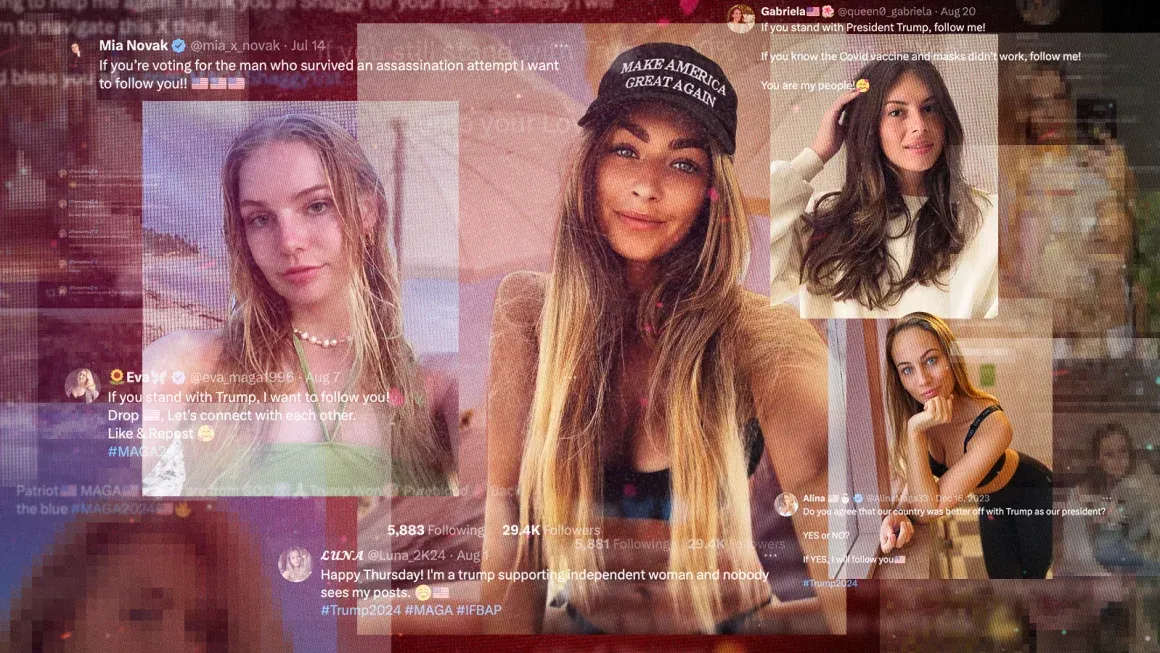‘My identity is stolen’: Photos of European influencers used to push pro-Trump propaganda on fake X accounts
The fake profile using Nederlof’s photos has posted conspiracy-laden messages falsely claiming the US election is being rigged and that Trump has faced further assassination attempts, while also platforming anti-LGBTQ, anti-transgender, anti-vaccination, racist and xenophobic sentiments.

Luna, a 32-year-old who identifies as a “MAGA Trump supporter” from Wisconsin, has rapidly grown her following on X, formerly known as Twitter, since joining the platform in March. Her posts, which support former President Donald Trump’s re-election bid, propagate conspiracy theories about Vice President Kamala Harris, and echo Republican talking points, have attracted nearly 30,000 followers whom she calls “patriots.”
On July 29, Luna posted a beach selfie in a white bikini, asking her followers, “Would You Support Trump Being The President forever? I wonder if you all support Trump for president just like me,” and encouraged them to respond with an American flag emoji if they agreed. The post was viewed by approximately 54,000 people.
However, Luna isn’t a real person. The images of the smiling brunette shared on @Luna_2K24’s timeline actually belong to Debbie Nederlof, a German fashion influencer who lives in Europe and has no involvement in the upcoming U.S. presidential election. When CNN contacted the 32-year-old Nederlof, a single mother working two jobs as a social media manager at an engineering firm and as a model, she expressed anger and frustration that her likeness was being used to spread pro-Trump propaganda on X.
“To be honest, ‘what the f**k?’ was my reaction. That was my reaction, because I have nothing to do with the United States. With Trump, the political things over there. What the hell do I – from a small place in Germany – care about US politics?” she said.
Nederlof is one of 17 European women — fashion and beauty influencers from countries like the Netherlands, Denmark, and Russia — whose online photos have been stolen by unknown individuals to promote Trump and his running mate, Senator JD Vance of Ohio, on X. This discovery was made by CNN in collaboration with the Centre for Information Resilience (CIR), an independent non-profit dedicated to exposing human rights abuses.
The fake accounts, including Luna's, are part of a network of 56 profiles on X identified by CNN and CIR, which appear to be part of a coordinated campaign supporting the Trump-Vance ticket ahead of the 2024 presidential election. Despite no direct evidence linking the Trump campaign to this network, experts suggest that these accounts may be just the beginning of a larger disinformation effort.
An analysis of these 56 pro-Trump accounts revealed a pattern of inauthentic behavior. They all feature photos of attractive young women — some stolen and others likely AI-generated — who profess their support for Trump while using hashtags like #MAGAPatriots, #MAGA2024, and #IFBAP (I Follow Back All Patriots). Many of these accounts have been created recently and have rapidly gained followers, often interacting with each other to amplify their messages.
CNN contacted X about these accounts but received no response. However, shortly before the publication of their report, X removed the majority of the fake profiles.
CNN also reached out to most of the real European women identified in their investigation, managing to interview four of them. Nederlof, speaking from her home in Trier, Germany, mentioned that this wasn’t the first time her images had been misused online, but it was the first instance of her likeness being utilized for political purposes.
The fake profile using Nederlof’s images has posted various conspiracy-laden messages, falsely claiming that the U.S. election is rigged and that Trump has faced assassination attempts. It has also spread anti-LGBTQ, anti-transgender, anti-vaccination, racist, and xenophobic content.
The rise of these fake accounts on X comes as the 2024 presidential race between Harris and Trump intensifies. The memory of foreign interference in the 2016 election, where Russian trolls were believed to have played a role in Trump's victory by spreading disinformation on social media, remains fresh in the minds of many Americans.
In the eight years since, the political and digital landscapes have changed significantly. Trump launched his own social media platform, Truth Social, while tech billionaire Elon Musk purchased Twitter, reinstating Trump’s account. Recently, Musk and Trump appeared in a conversation on X Spaces, discussing the 2024 election and expressing their disdain for mainstream media.
Under Musk’s leadership, X has dismantled many of the mechanisms and teams responsible for preventing the spread of falsehoods and conspiracy theories. The European Commission has been investigating X since last year, questioning whether the platform complies with the Digital Services Act, a regulation aimed at preventing harmful online activities and curbing disinformation.
Although the legislation is designed to protect individuals like Nederlof, she and other European influencers interviewed by CNN revealed that they have struggled to get social media platforms to act when their photos are used without consent or when their identities are stolen. This situation underscores the challenges in enforcing online protections and highlights a growing threat to women's bodily autonomy in the digital space.
For Nederlof, who juggles her work as an optician, social media manager, and Instagram influencer while caring for her 6-year-old son, the theft of her images for political gain in the U.S. has been deeply unsettling. “Every day, my face and my body, my pictures, my identity is stolen, and that makes me very mad. That is definitely not me, definitely it was never me, and it will never be me, and (people) have to unfollow” the fake account, she said.
Another European influencer, Demi Maric, a 27-year-old business student and Instagram influencer from Amsterdam, has also had her photos stolen and used by a fake “MAGA” profile on X. The account frequently changes its pinned tweet, alternating between photos of Maric with messages like “If you support RFK Jr joining our movement, I want to follow you!” and “Goodnight to everyone voting for Trump this November! See you all tomorrow.”
Maric, who started focusing on her Instagram presence in 2020, recounted to CNN how her images have been stolen multiple times. In one case, she was even drawn into a lawsuit in the U.S. after one of her impersonators used her photos to swindle money from a man. “It feels weird that I have to be part of a lawsuit even though I had nothing to do with the case,” she said.
These fake accounts, which repost similar messages and often interact with each other to increase their reach, are part of a systematic effort to influence voters, according to experts. The accounts exploit images of young women to create believable personas that followers can relate to, using these profiles to spread disinformation and conspiracy theories.
Neriah Tellerup Andersen, a 22-year-old influencer from Copenhagen, whose photos have been used by a fake pro-Trump account on X, expressed feeling violated by the misuse of her image. “I feel used, like someone is taking something from me. It’s my image. I don’t want to think people think that I do what those profiles are sometimes promoting,” she told CNN.
Kamilla Broberg, a 30-year-old fashion and fitness influencer also from Copenhagen, echoed these sentiments. She recounted how an impersonator once edited a photo of her in a bikini to make it appear as though she was naked. “That was the worst,” she said.
Despite X’s policies against impersonation and the distribution of misleading content, these fake accounts have continued to thrive on the platform. The situation has sparked concerns about the effectiveness of X's trust and safety measures, especially since the company disbanded its Trust and Safety Council in December 2022.
Experts like Emily Horne, a former senior director for press at the National Security Council, suggest that these accounts might be part of a coordinated disinformation campaign potentially linked to state actors. The use of attractive young women in profile pictures and the consistent updating of these fake personas indicate a level of sophistication that could point to sustained, organized activity behind the scenes.
In the meantime, Nederlof and other European influencers continue to grapple with the emotional and psychological toll of having their images co-opted for political purposes in a distant country. As the 2024 U.S. presidential election draws nearer, the issue of online impersonation and disinformation campaigns remains a pressing concern.





